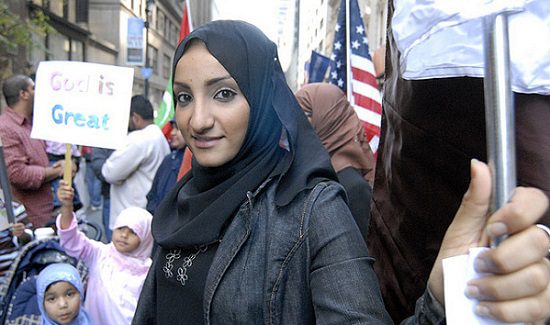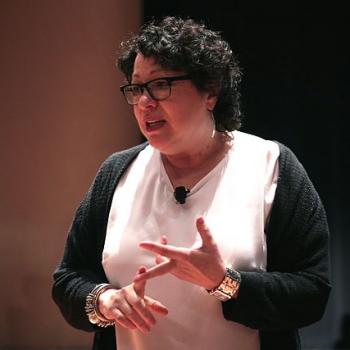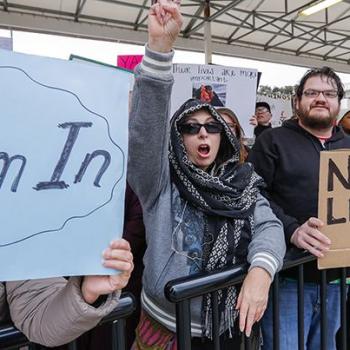
My sister-in-law called me up out of the blue last week, talking to me for 20 minutes in a breathless catch-up of things going on in the nation, in the world, about the current climate for Muslims and Muslim women, about what I was hearing and covering through work, about our daughters, about something that just had happened to her that day:
A friendly colleague where she worked (she’s a teacher and just joined a new school a few months ago) came to her and abruptly started talking about how she was worried for my sister-in-law, asking her if she was ok and apologizing for the hateful anti-Muslim rhetoric roaring across the nation.
My sister-in-law, touched by her colleague, told her there was no need for apologies. Certainly she was no more responsible for the mean-spirited things some were saying or the attacks on various Muslims and mosques than my sister-in-law was for any attacks perpetuated by Muslims.
I want to do something to help, this colleague said. I was thinking to wear a headscarf for a day or a few days? What do you think?
Ahh yes, wearing the headscarf to show solidarity with Muslims and specifically Muslim women. Something many women have been doing of late. Something Wheaton College Professor Larycia Hawkins got put on administrative leave for (though Wheaton administrators said it wasn’t about her headscarf she had donned for the duration of Advent, but rather her statements that Christianity and Islam share many things, and that the God of Muslims is the same as the God of Christians.)
Probably one of the least favorite topics that Muslim women want to talk about is the hijab or the headscarf. And yet, we can’t seem to get away from it. Men continue to want to discuss women’s dress in khutbas (sermons) and other articles, the media seems permanently fixated on it (just google hijab and Muslimah Media Watch to learn EVERYTHING you want to know) – it almost feels like the sixth pillar of Islam.
(To be clear – it is not the sixth pillar of Islam.)
In the lead-up to the Republican primaries, with presidential candidate Donald Trump and others continuously focusing on otherizing Muslims and pushing forth an anti-Muslim agenda, distrust and outright hatred of Muslims is alarmingly on the rise. The attacks in Paris and San Bernardino, have naturally led to greater suspicion (unfair or not) against all Muslims.
And in the midst of this, Muslim women who wear the hijab, being the most visible representation of Islam, are in the middle of the heated hate.
But, for as many stories I’m hearing and seeing reported about anti-Muslim attacks and rhetoric, I’m reading just about as many feel-good stories of people standing up for and with Muslims – in words, deeds and actions.
Those actions are often coming out in the form of wearing a headscarf.
That many Muslim don’t wear a headscarf is a fact I want to simply state here as well, including the fact that many Muslim women around the world as well as converts to Islam face pressure to wear the headscarf.
That happens, too.
What also happens every day is Muslim women who choose to wear the headscarf, having searched their hearts, their deen or whatever motivates them to do so. I am one of these women. Muslim women also take off their headscarf after searching their hearts, their deen or whatever motivates them to do so.
These are all aspects of the headscarf-wearing experience, which is but one aspect of being Muslim.
But, the fact is that for better or for worse people are honing in on people who do choose to wear the headscarf – as targets, or as a way they can identify and stand up for Muslims.
I welcome the latter.
And thus I reject what authors Asra Nomani and Hala Arafa say in their new Washington Post article:
In the name of “interfaith,” well-intentioned Americans are getting duped by the agenda of Muslims who argue that a woman’s honor lies in her “chastity,” pushing a platform to put a headscarf on every woman.
Please do this instead: Do not wear a headscarf in “solidarity” with the ideology that most silences us, equating our bodies with “honor.” Stand with us instead with moral courage against the ideology of Islamism that demands we cover our hair.
Just, no.
Whatever your issues may be with the headscarf, whatever arguments you want to put forth regarding if it is something that Islam, the Quran and hadiths require of Muslim women, this is not the time for this discussion to happen. Whatever loathing you have for the headscarf or other forms of modest Muslim dress – turning on Muslim women who wear the headscarf and those who wish to show solidarity by wearing it is, as activist Linda Sarsour says, disingenuous.
Hena Zuberi, a friend and editor over at MuslimMatters.org, said it pretty clearly today:
I ask Muslim women who do not cover their hair to either stand in solidarity with sisters who cover or sit-down and stop talking about #hijab. Not now, not right now.
Not that this is a competition of marginalization, but you are simply not going through what women who cover are going through. This is a time when women who cover are being beaten at our local grocery stores, they are being profiled by law enforcement and asked whether they are carrying weapons during traffic stops for no good reason except the fact that they have a scarf on their head. Women are losing their jobs because they were chose to cover. Some are too scared to leave their homes with their children. And this the time some women rights activists and so called feminists are going to use to tell us that we are brainwashed and Saudized. This is hypocrisy and a slap for women who actually care about women.
To use this time to say Muslim women who cover are extreme and that Islam should be reformed?!
You don’t want to cover, don’t cover, no one is forcing you. You don’t find strength, or peace or God in it, okay I can accept that. You don’t want people of other faiths to don the hijab to show solidarity, that is your choice. You want to practice Islam in a way that you want to follow it, go ahead.
But do not use this time of heightened anti-Muslim bigotry to virtually beat Muslim sisters who cover. Do not use this time to police our clothing or the way we practice our faith, or the way we chose to love God. The way we emulate Mary the Mother of Christ.
Don’t infantilize us. What about our choice to follow a 1400 year old faith tradition, agreed upon unanimously by mainstream Islamic thought? A tradition that is rooted in all Monotheist faiths.
And please don’t try to divide all of our covering from the Divine. Doing this increases the spiritual abuse and pressure that you want to fight. When we do it for the Divine, we have to say there is no compulsion in the religion at the same time. That God doesn’t accept it if it is not from the core of your spiritual heart.
When you link covering to extremism, you fall right in line with the anti-Muslim bigots.
Either #bemysister at this time when women’s bodies are being beaten and already marginalized women are being targeted, or really…. just be quiet… for now.
P.S. I thought this debate has died. We had come to the point of maturity where every other article was not going to be about hijab- where we had moved beyond the veil. P.P.S We have a right to wear it in this country and work in it #constitutionallycovered.
The headscarf/hijab debate will never die. This I know. It occurs over and over in my own house when my husband asks me why I want to continue wearing it (it’s been a decade now) while at the same time respecting my choice to do so.
It occurs at Wheaton College when a number of students, in support of Professor Larycia Hawkins, wore the headscarf on their travels home.
It occurs when non-Muslim women engage in headscarf-wearing experiments, when they “wear a hijab for a month” or similar experiments documented in the media. It occurs in videos of Muslim women showing others how to wrap a headscarf, women spending a day walking around in a scarf and then reporting how they felt.
It occurs when the hijab is fetishized in movies like “Sam and Amira.”
It occurs when Iranian woman protest the 1979 hijab law in their country through a Facebook campaign called “My Stealthy Freedom.”
But it shouldn’t occur in Muslim women calling out others for wearing the headscarf, or saying that we need to “clarify to those in universities, the media and discussion forums that in exploring the “hijab,” they are not exploring Islam, but rather the ideology of political Islam as practiced by the mullahs, or clerics, of Iran and Saudi Arabia, the Taliban in Afghanistan and the Islamic State.”
My hijab is not born of a so-called “political Islam.”
It’s born of my heart and mind.
My dear friends – if you want to place a piece of cloth on your head as show of solidarity with Muslims, by all means, do so. I welcome it and appreciate it. It’s not the only thing you can do – there are many ways to show solidarity (because there are many Muslims who don’t wear headscarves): Cultivate friendships with Muslims, have conversations, smile, reject anti-Muslim rhetoric, ask genuine questions. Disagree with respect if you wish. Listen. Learn.
And if you want, wear a headscarf.











